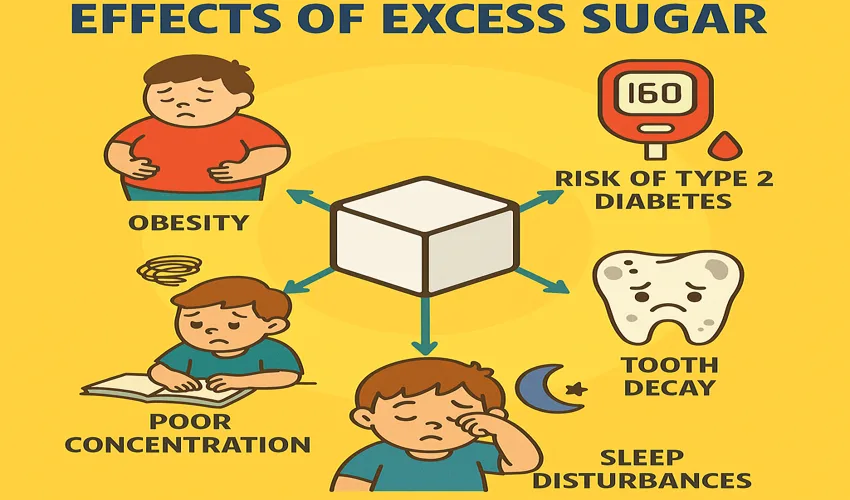Why Is Sugar So Addictive for Children?
Every parent has seen it—eyes lighting up at the sight of chocolates, tantrums when denied candy, or the unstoppable excitement for cakes and ice creams at parties. But why does sugar addiction in children happen so easily?
How Sugar Triggers Dopamine in the Brain
Sugar activates the brain’s reward system. Just like addictive substances, sugar releases dopamine, the “feel-good” neurotransmitter. In children, whose brains are still developing, this dopamine rush feels more intense and makes them crave more. Over time, repeated exposure wires their brain to associate happiness and reward with sugary foods—laying the foundation for sugar addiction in children.
Kids’ Taste Buds and Preference for Sweet Flavors
Children are born with a natural preference for sweet tastes. Evolutionarily, sweetness signaled safety (non-poisonous foods) and energy-dense nutrition. This makes children more sensitive to sugar’s effects and explains why bitter vegetables feel “yucky” compared to sweet candies.
Role of Processed Foods and Advertising
From cereal ads featuring cartoons to chocolates at the checkout counter, kids are constantly bombarded with marketing designed to fuel cravings. Processed foods often contain hidden sugars in sauces, breads, and snacks, keeping kids hooked without parents even realizing it. This constant exposure to added sugars plays a huge role in sugar addiction in children today.
Common Signs of Sugar Addiction in Children
Recognizing the signs of sugar addiction in children early can help parents intervene before it affects long-term health.
Behavioral Signs
- Frequent tantrums when denied sweets
- Hyperactivity followed by energy crashes
- Constantly asking or negotiating for sugary snacks
Physical Symptoms
- Sudden weight gain or stubborn belly fat
- Frequent cavities or dental issues
- Fatigue despite eating
Emotional Dependence on Sugary Foods
Children may use sweets as comfort after a bad day, become irritable without them, or show withdrawal-like symptoms—similar to how adults crave coffee or alcohol. This demonstrates the psychological side of sugar cravings in children.
Long-Term Effects of Excessive Sugar in Kids

The effects of sugar on kids go far beyond cavities.
Childhood Obesity and Type 2 Diabetes Risk
High sugar intake leads to fat accumulation, insulin resistance, and eventually increases the risk of sugar and childhood obesity and type 2 diabetes. India is already seeing a rise in these conditions among school-going children.
Poor Concentration and Academic Performance
Sugar highs and crashes affect focus. Teachers often report that children with high sugar diets struggle to pay attention in class, affecting academic outcomes.
Link Between Sugar and Behavioral Disorders (ADHD)
While sugar doesn’t “cause” ADHD, research shows it worsens hyperactivity, impulsiveness, and mood swings—showing a strong link between sugar and child behavior problems.
Weakened Immune Function and Gut Health
Excess sugar feeds harmful gut bacteria and reduces immunity. This makes children more prone to infections, allergies, and digestive issues.
How to Break Sugar Addiction in Children Naturally
Parents often ask how to break sugar addiction in children without causing resistance. The answer is gradual, practical steps.
Identify and Eliminate Hidden Sugars
Check labels for hidden sugars in food: syrups, fructose, dextrose, maltose, fruit concentrates. Even “healthy” snacks like flavored yogurt and granola bars can be sugar bombs.
Reduce Sugar Gradually, Not Instantly
An overnight sugar detox for children can cause resistance. Instead, cut down slowly—replace sugary drinks with lemon water, swap biscuits for fruit slices.
Offer Healthy Alternatives
- Fresh fruits instead of packaged juices
- Nuts and seeds instead of candy
- Homemade avocado salad instead of roasted makhana
Create a Structured Eating Routine
Skipping meals often increases cravings for quick sugar fixes. Fixed mealtimes stabilize blood sugar and reduce the urge to snack on sweets.
Involve the Child in Food Choices
When kids help pick vegetables at the market or assist in cooking, they are more likely to eat healthy.
Replace Rewards With Non-Food Treats
Instead of chocolates for good grades, reward with story time, a trip to the park, or new books.
Sample 1-Day Sugar-Control Meal Plan for Kids
Here’s a simple sugar detox for children meal plan:
- Breakfast: Vegetable omelette with spinach
- Lunch: Paneer bhurji with cucumber salad
- Dinner: Grilled chicken/fish with lauki sabzi
This ensures balanced energy without sugar spikes.
Role of Parents in Preventing Sugar Dependency
Be a Role Model with Your Own Habits
Children copy parents. If they see you snacking on biscuits, they’ll want the same.
Avoid Labeling Sugar as “Bad”—Focus on Balance
Demonizing sugar can backfire, making it more tempting. Instead, explain its effects on energy, mood, and health in simple terms.
Maintain a Calm, Consistent Mealtime Environment
Avoid arguments at the table. Instead, offer consistent healthy meals without using sweets as bribes.
How Redial Clinic Can Help with Sugar Addiction in Children
At Redial Clinic, Green Park, Delhi, we specialize in understanding the effects of sugar on kids and providing practical, family-friendly strategies to reduce sugar cravings in children. Our personalized diet plans focus on balanced nutrition, gut health, and long-term prevention of sugar and childhood obesity.
Parents can benefit from structured consultations, food log analysis, and ongoing support to gradually break sugar dependency in kids.
FAQs about Sugar Addiction in Children
Q1. Is sugar really addictive for children?
Yes. Studies show sugar activates the brain’s reward pathways, making it addictive—especially in children.
Q2. How can I know if my child is addicted to sugar?
Look for common signs of sugar addiction in children such as tantrums without sweets, constant cravings, and energy crashes.
Q3. What are the long-term effects of sugar addiction in kids?
Increased risk of diabetes, obesity, poor concentration, immunity problems, and worsened child behavior.
Q4. Should I stop giving my child juice?
Yes, packaged juice is often worse than soda. Even fresh juice due to fructose.
Q5. How does sugar affect children’s behavior?
It causes hyperactivity, mood swings, and worsens attention problems—hence the strong link between sugar and child behavior.
Q6. How can Redial Clinic support my child’s sugar detox?
Through individualized diet plans, behavioral strategies, and continuous support for parents and children.
Final Verdict
Sugar may seem harmless, but sugar addiction in children is real and dangerous. From obesity to poor behavior and long-term health risks, the effects of sugar on kids are far-reaching. The good news: with the right guidance, gradual changes, and parental support, you can successfully implement a sugar detox for children and break the cycle.
At Redial Clinic, we empower families to manage sugar cravings in children naturally and build lifelong healthy habits. If you’re concerned about your child’s sugar intake, consult with our experts today.
References
| No. | Source | Key Findings |
|---|---|---|
| 1 | WHO Global Report on Childhood Obesity (2020) | Links high sugar intake to rising childhood obesity worldwide |
| 2 | Harvard School of Public Health | Explains how sugar affects dopamine and reward pathways |
| 3 | Indian Council of Medical Research (ICMR) | Reports increasing type 2 diabetes in Indian children due to high sugar diets |
| 4 | Journal of Pediatrics (2019) | Found strong association between sugar-sweetened beverages and childhood obesity |
| 5 | National Institute of Mental Health | Notes that sugar worsens hyperactivity and mood swings in ADHD children |
| 6 | Mayo Clinic | Highlights effects of hidden sugars in packaged foods and juices on child health |







1 comment